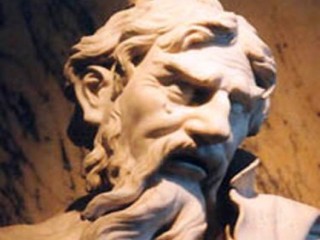
Heraclitus biography
Date of birth : -
Date of death : -
Birthplace : Ephesus, Ionia
Nationality : Greek
Category : Historian personalities
Last modified : 2011-06-07
Credited as : Philosopher, On the Nature of the Universe,
Heraclitus of Ephesus was born in the lonian city of Ephesus and is said to have renounced the privileges to which his social rank entitled him (perhaps the kingship) in favor of his brother. The available evidence for his life is too scanty for a clear picture to emerge. He is a solitary figure who claims to have sought the truth within himself, and although his work shows familiarity with the writings of other philosophers, particularly those of Anaximander, both his unique ideas and his peculiar literary style set him apart.
Many fragments of Heraclitus's work, commonly known as On the Nature of the Universe, have survived, although their interpretation is made difficult by their lack of context and by the abbreviated, oracular style in which they were written. Because of the difficulty of his thought, Heraclitus was known throughout the ancient world as "the Obscure" (skoteinos). The basis of his philosophy is the world of appearance, the sensible world. All things are constantly changing, and thus it is impossible to step into the same stream twice. Change is due to the mutual resolution of opposites such as hot and cold, day and night, hunger and satiety, although underlying all change and guiding it is a basic unity expressed by the idea of the logos. He also believes that that which seems to be at variance with itself through conflict or tension is in reality expressive of a kind of harmony. He asserts that the truth of the logos is partially expressed by the concept of Zeus.
Although the cosmos, in Heraclitus's view, has always existed and therefore did not come into being at some arbitrary point in time, fire, under the influence and guidance of the logos, is the basic substance in it, and all elements are some transformation of it. It is not completely independent but is infused with the logos, as is the human soul, and it is for this reason that the soul may come to grasp the truth of the cosmos, although human understanding may reach only childish limits.
Heraclitus enjoins men to learn the nature of the universe through an understanding of their own souls and has been considered as the first mental philosopher. Exact language and thought are of paramount importance to him, since he conceives of the logos as both the underlying order in the cosmos and the soul's discourse upon it. Since the truth is complex and difficult to grasp, he uses the oracular style of Delphi and merely hopes to "indicate" the truth.
He is important as one of the first Greek philosophers to take up the problem of knowledge, and he is undoubtedly the first to stress the importance of an understanding of the soul as a step toward understanding the external world order. His writing provided much of the theoretical basis for Stoicism.
















